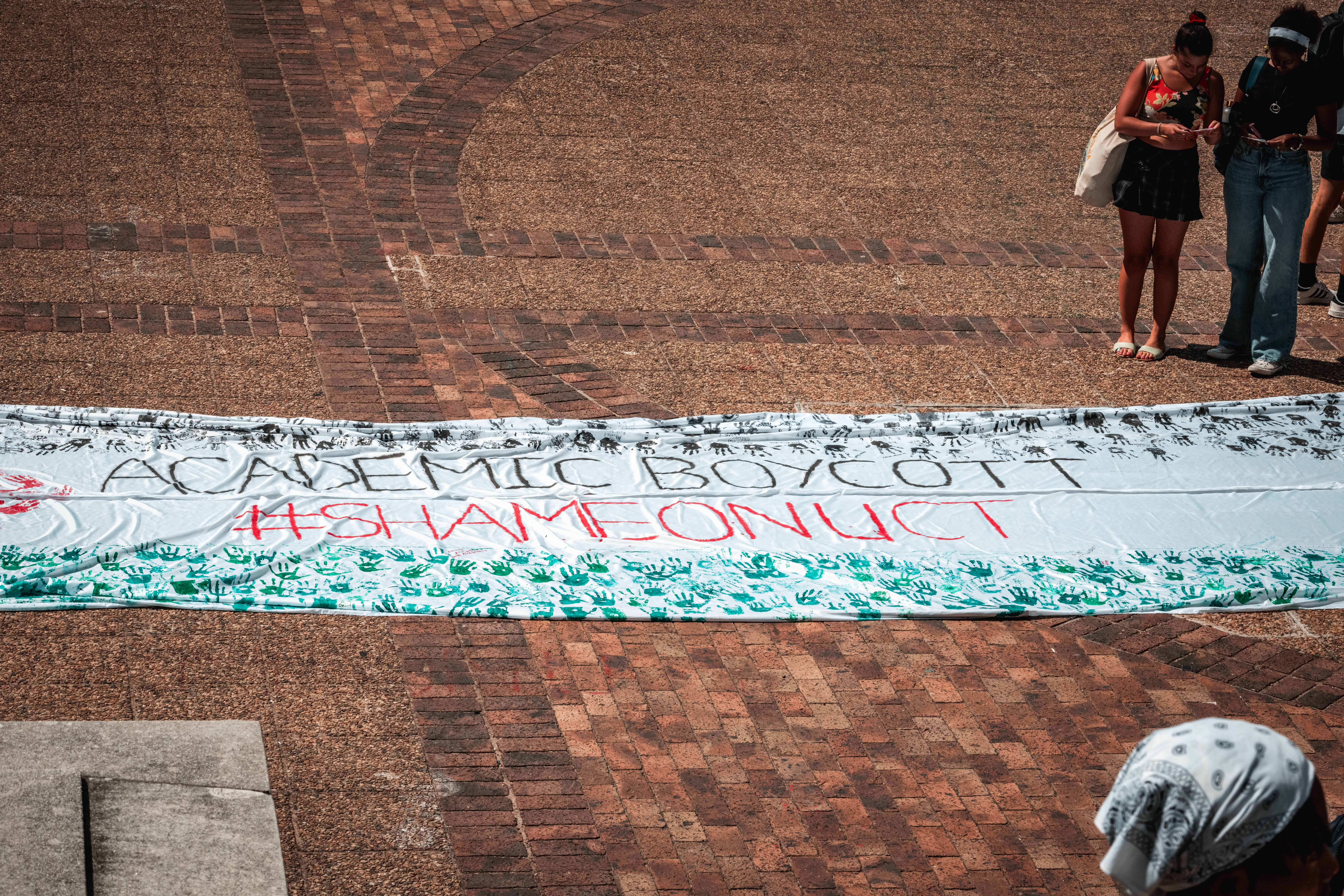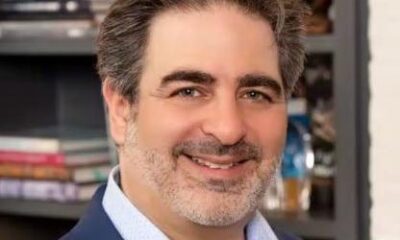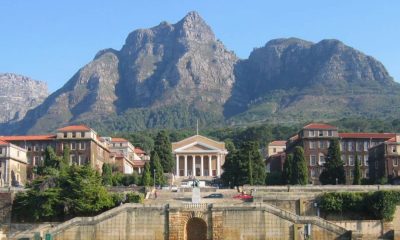
Banner

Israel boycott motion fails at UCT
A motion put to a vote by the University of Cape Town (UCT) senate calling for an academic boycott of Israeli institutions and research entities failed on 13 March, after being voted down by a narrow margin.
It was one of three motions regarding Israel put to the senate on 8 March. According to reports, after vigorous debate, it was decided that the first motion should be an anonymous online vote to prevent intimidation. Sixty senate members voted in support of the motion, 75 voted against, and 15 abstained.
The motion, put forward by Professor Susan Levine, stated that, “The University of Cape Town resolves to not participate and co-operate in any events, activities, agreements, or projects involving Israeli academic institutions, research entities, lobby groups, corporations, foundations, academic forums, and entities that accept funding from Israel.
“This stance will be maintained until these institutions clearly condemn the ongoing genocide of Palestinian people at the hands of the Israeli state; until these institutions categorically condemn violation of Palestinian human rights and violations of international law; and, until they announce their commitment to safeguarding Palestinian people’s right to life, equality, and dignity.” The motion was seconded by Associate Professor Tracey Naledi.
Professor Adam Mendelsohn, the director of the Kaplan Centre for Jewish Studies and a member of the senate, said, “The implications of a pro-boycott vote were potentially calamitous”. David Benatar, emeritus professor of philosophy, said, “The university would have paid a heavy price if it had adopted the resolution, which would have required the approval not only of senate but also of [higher body], the council. The risk of that has been mitigated, at least for now.”
Cape South African Jewish Board of Deputies (Cape SAJBD) Chairperson Adrienne Jacobson said, “The Cape SAJBD is pleased that calm and rational minds prevailed. For the second time in five years, the UCT senate has rejected an academic boycott, and we welcome the decision. Academic freedom is sacrosanct, especially at a world-renowned educational institution like UCT. Our political views, no matter what they are, shouldn’t compromise this.”
Sara Gon, who has written extensively about academic boycotts at UCT, said, “The senate is the top body for determining academic matters at UCT, and it’s academic matters that are at the heart of such a significant decision.” Mendelsohn said the senate’s membership included all full professors, heads of department, members of the student representative council (SRC), and other representatives.
In response to the vote, the UCT SRC, which is mostly made up of members of the Economic Freedom Fighters (EFF) student organisation, said it was “disgusted” at the outcome of the vote, adding that “this speaks to the regressive attitude of this institution in protecting the privileged. In this instance, Israel is the aggressor and the Palestinian people are the oppressed and have been for over 75 years. The EFF Students Command-led SRC will be communicating with students, progressive student formations, academics, and staff on steps to be taken in making the Palestinian voice heard and in solidarity with the Palestinian struggle against colonial Israel. From the river to the sea, Palestine will be free.”
Mendelsohn said the decision to take the vote online “was made at the end of a very long meeting. After more than two hours spent debating a single motion, senate was exhausted and divided. Senate typically votes by a show of hands, but for very contentious matters can opt for a paper ballot or an online poll. In this instance, the call for an online poll was broadly supported.
“The senate meeting was heated,” he said. “Only three motions were on the agenda, all relating to Israel. Attendance was relatively poor. Many of the loudest voices at the meeting were highly critical of Israel. Their arguments relied on emotion. Most of the counterarguments called for consideration of potential costs to the university. In such an environment, it was difficult to tell what the majority felt and thought until the results of the ballot were in.”
Gon believes “the online, secret vote was significant. In the febrile atmosphere that UCT often finds itself in when anti-Israel protests erupt, this is how it should be done. And it proves this by virtue of the high levels of intolerance at UCT due to the Israel/Hamas war. Any other way would have been a farce.
“The immediate assumption [of the outcome of the vote] would be that within the virulently antisemitic and anti-Israel sentiment, and the activities of the pro-Palestinian lobbies at UCT, the vote would easily be against Israel,” she said. “However, most interesting and positive is that the very same conflict also invoked a sense that Israel deserved more support than its detractors would consider. With anonymity, senate could vote without fear of intimidation.”
Another motion that was put forward to the senate by Professor Leslie London and seconded by Associate Professor Fatima Seedat, and is yet to be voted on, states, “The manipulation of the definition of antisemitism to include any criticism of Israel or Zionism is both intellectually without foundation and a violation of academic freedom.”
It calls for a rejection of the definition of antisemitism by the International Holocaust Remembrance Alliance, which states that “denying the Jewish people their right to self-determination – for example by claiming that the existence of a state of Israel is a racist endeavour” is antisemitic, as is “drawing comparisons of contemporary Israeli policy to that of the Nazis”.
This motion also states that “the evidence suggesting that the destruction of Gaza’s education systems was a deliberate plan of the IDF [Israel Defense Forces] must be examined by the ICJ [International Court of Justice] in its determination of genocidal intent”. It also called for “an immediate ceasefire, the passage of humanitarian aid, and the return of all captives”.
Gon believes this motion is “so sweeping and all-encompassing, it’s unlikely to pass unless it’s radically amended. It’s trying to ‘out-ICJ’ the ICJ.”
A third motion put to the senate, proposed by Professor Lydia Cairncross and seconded by Associate Professor Ruchi Chaturvedi, which is also yet to be voted on, states that “UCT senate resolves that no UCT academic may enter into relations, or continue relations with, any research group and/or network that includes members of the Israel Defense Forces, and/or any member of the broader Israeli military establishment.”
Gon believes this motion “may succeed just as a sop to the anti-Israel lobby, as it probably means little in reality to UCT”.
“The fact that the vote was defeated first time round suggests that UCT at the top levels hasn’t welcomed boycott resolutions,” Gon said. “It hasn’t, for probably a variety of reasons, wanted to be an outlier in academia.”











Colin
March 31, 2024 at 12:18 am
The situation between Israel and Apartheid is simply not comparable, despite ANC psyops and its “neo colonial” narrative. (A narrative that has its roots in Algeria — where Mandela trained — and Frans Fanon).
There are superficial similarities, e.g. both Afrikaners and Israelis after suffering atrocities in concentration camps (the former during the Boer War) got independence in 1948. But:
• SA never had nor has a contested site that is holy to two, never mind three, religions. We have a few holy sites (eg Zion City Moria or Nhlangakazi), but nobody, except adherents, wants them.
• With all its faults, the ANC and other liberation groups had no equivalent of the Hamas Charter, which literally called for Jewish genocide. On the contrary, the Freedom Charter is an inclusive wish-list. (Whether the current ANC adheres to it or not is a different topic).
• The Struggle was mostly conducted against military (or quasi military) targets. Pure civilian attacks (eg St James Church) were exceptional (and PAC, not ANC). There was simply no equivalent of rockets being fired from neighbouring states at civilian targets in South Africa.
• No Israeli Jewish family would entrust their children to an Arab domestic (assuming they could afford one); I am yet to hear of a SA white family that refused to entrust their children to a black nanny out of fear. There is simply a different level of bitterness, fear and mistrust (and that’s pre-Oct7)
All this meant that there was far more possibility for reconciliation in SA than in Israel.
Ironically, those calling for a two-state solution are invoking the arguments that underpinned apartheid/”separateness”.
I believe that Steenhuizen got it wrong.
A future SA government would be obliged to review the evidence placed before the ICJ and resubmit it if it was found to be false or exaggerated (It took Israel weeks to discover the Oct 7 death toll; even now the death toll from the collision of the Dali container ship with the Baltimore bridge is uncertain; yet Hamas Ministry of Health knows exactly how many men/women/children/civilians are buried under the rubble on a same day basis!). Bear in mind that the ANC has committed perjury in SA courts (1) in order to protect al Bashir (2) In the Ezulweni “election banners” case, the SCA was quite scathing about its evidence. It is not far-fetched to assume that it also lied at ICJ, especially giving the timeline of the ANC’s facing liquidation, the communications between ANC/SA and Hams/Iran and the disappearance of its financial woes. One factor influencing a future government will be the outcome of the IEC’s investigation into the ANC’s finances.
shaun
April 4, 2024 at 9:13 pm
Why has Israel not charged Hamas with genocide at the ICJ ?